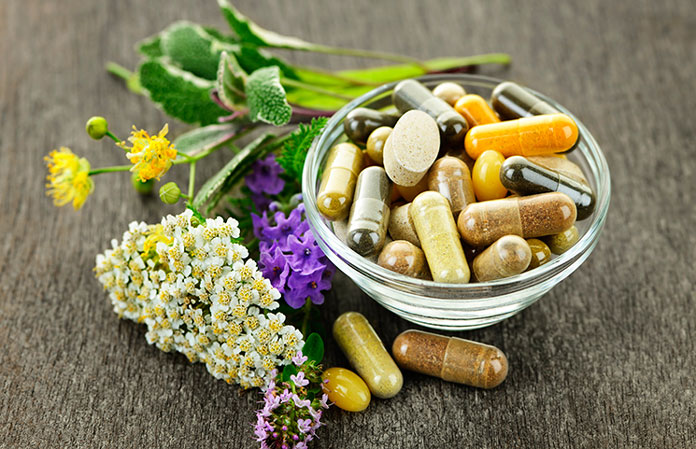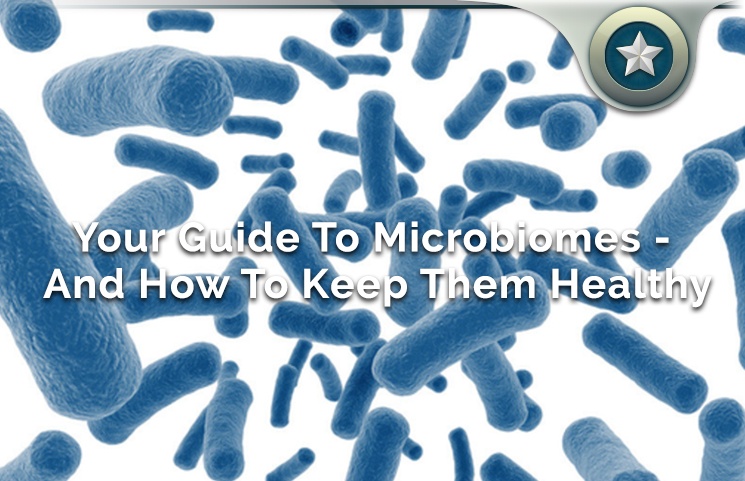Believe it or not, the human body is actually much less “human” that it is perceived to be.
Yes, you heard that right.
As a matter of fact, the human cells in your body are far outnumbered by the organisms that surround it.
While you let that piece of information sink in, read this:
Inside your body, there lies a very complex and vast ecosystem consisting of tiny microbes. This ecosystem is known as a “microbiome,” and consists of over 10-100 trillion microbial cells. Most of these microbial cells are present in your digestive system (i.e. your gut) and a large percentage of these are actually bacteria.
Every human being has an internal microbiome of its own, and every microbiome is very different from others. In fact, while two people share up to 99.9% similarity in their human genes, the same two people will have microbiomes that are up to 80-90% different from each other. Interesting, right?
And while you may start to cringe at the very thought of bacteria, having (of course) been practically trained to associate it with poor health and grave illnesses, you should know that not all bacteria are harmful. As a matter of fact, there are several different “good” bacteria, without which it would be impossible to maintain a good health.
While the field of human microbiome research is, as of today, at a very young stage, what we do know fairly indicates that our microbiomes have a very significant role to play when it comes to the functioning and health of our bodies.
According to research, a healthy body is almost entirely dependent on whether or not we have a healthy microbiome, and in particular a healthy gut.

What Role Does The Microbiome Play In The Human Body?
As of today, scientists have identified over 10,000 various species of microbes which live in the human body. Each of these microbes have their own set of genes, as well as their own bodily functions.
And although scientists are yet to find out how each bacterial strain affects your body, the fact that microbiomes do a lot for our body is surely true.
Every variety of microbe that is present in your microbiome has a very important role to play in almost every function of your body.
First of all, your microbiome helps in breaking down and extracting nutrients from the food you consume. Not only do microbes in your gut help in producing vital nutrients (like fatty acids and fat-soluble vitamins), they also help you maintain a healthy barrier between your bloodstream and your gut, along with warding-off harmful bacteria – those “bad guys” you've been told about your entire life.
Apart from that, microbes also regulate levels of inflammation, influence your genes, protect you from damage done by free radicals, promote healthy joints and connective tissues, allow you to maintain a healthy bone density, and also help you maintain your metabolism and immune system.
Furthermore, the good bacteria present in your gut also help you manage neurotransmitter activity in your body.
Since there are several neurometabolic and neurochemical pathways between your microbiome and your brain, the condition of your microbiome will have a profound impact on various aspects of your body's psychological processes, from your memory, mood, energy levels, and level of alertness to your thought patterns and your ability to combat stress.

Why Is It Important To Care About Your Microbiome?
As mentioned before, the microbes present in your microbiome have a significant impact of the quality of almost every function of your body, from nutrient production, digestion, and detoxification, to immune system functioning, among so many others. With a healthy microbiome, all of these functions are ensured and your bodily systems run smoothly.
An unhealthy microbiome, however, leaves your body vulnerable to a plethora of illnesses. Believe it or not, almost every disease that affects the human body is in some way related to an unhealthy gut.
According to scientific research, an unhealthy and imbalanced gut brought about by an unhealthy microbiome can lead or at least contribute to the following conditions:
- Cancer
- Obesity
- Cardiac Diseases and complications
- Type 1 diabetes
- Brain disorders, such as Dementia and Alzheimer's
- Autoimmune diseases (such as arthritis, leaky gut, inflammatory bowel disease, and Hashimoto's)
- Infertility
- Lesser longevity
- Complications in pregnancy
- Sensitivities and Allergies
- Mood disorders, such as anxiety and depression
- Deterioration of joints and connective tissues
- Learning disabilities, such as ADHD and autism
In most cases, the health of your microbiome and the above health issues are connected by inflammation. One of the major reasons behind most diseases, inflammation happens when your gut is in poor shape.
When a microbiome is healthy, inflammation levels in the body will remain low, which in turn significantly reduces the risk as well as the symptoms of most (if not all) of the aforementioned health issues.
To put it simply, if you're among the many who care about and want to live a healthy life, you must always keep yourself concerned about your microbiome's health.

Taking Care Of My Microbiome and Ensuring That It Is Healthy
I am assuming that by now, you've surely understood the importance of your microbiome and why you must keep it as healthy as possible. Here are some ways in which you can take care of your microbiome:
Maintain A Healthy Diet
The kind of diet you follow has a profound effect on your microbiome's health. By altering your diet, you can support your microbiome in 2 ways –
1. By eating foods containing anti-inflammatory properties.
Your diet must contain an abundance of foods that have anti-inflammatory properties. This includes fresh vegetables (at least 4-5 servings per day), whole fruit (not the same as fruit juice; at least 3-4 servings per day), and spices and herbs such as basil, turmeric, ginger, thyme, and oregano, which you can add to your teas and include in your cooking.
Your diets should also contain a healthy amount of probiotics, such as kimchi, yogurt, kvass, kombucha, sauerkraut, fermented vegetables, and kefir. Probiotics, as the name suggests, promote the growth of healthy bacteria in the gut and force away the harmful ones. You must also have essential prebiotics, such as onions, garlic, tomatoes, asparagus, radishes, leeks, and Jerusalem artichokes.
Other than the above, you must also consume healthy fats, which are generally found in cage-free eggs, wild-caught fish, grass-fed/pasture-raised meat and butter, extra-virgin olive oil, coconut oil, seeds, and nuts. Even having dark chocolate/cocoa, red wine, organic coffee, and green tea in moderation helps a lot.
2. By cutting down on inflammatory foods.
These include:
- Pasteurized dairy products
- Refined vegetable oils, such as corn, canola, and soybean
- Trans fats and hydrogenated fats, often found in fried foods and processed foods
- Conventionally raised or factory-farmed meat, poultry, and eggs
- Refined vegetable oils, such as corn, canola, and soybean
- Foods with added sugars (packaged breads, canned items, condiments, cereals, etc.)
- “Junk” foods
- Refined carbohydrates and processed grains
- Foods with preservatives, artificial ingredients, and sweeteners

Take Regular And Healthy Supplements
Supplements such as caroteniods, selenium, omega-3 fish oils, co-Enzyme Q10, and vitamins C, D, and E help prevent the spread of free radicals which have an adverse effect on your microbiome. Curcumin and Magnesium are some other supplements that help you promote a healthy microbiome.
Having a daily probiotic supplement, furthermore, will also ensure that your gut contains a good amount of healthy bacteria.
Avoid Taking Antibiotics As Much As Possible
While antibiotics are indeed lifesaving, they are in fact nothing less than grenades for your body.
Just as they kill the harmful bacteria present in your body, they also kill the good ones. Which in turn lowers the effectiveness of your immune system and increases the risk of diseases, infections, and allergies.
While antibiotics are indeed necessary in some situations, you must try to avoid them whenever you can. Instead, you can try essential oils and anti-microbial herbs, such as tea tree, thyme, oregano, and clove, among others. Whenever you do take antibiotics, take a healthy supplement of probiotics so that the good bacteria can get restored in your gut.

Do Not Take Proton Pump Inhibitors (PPIs)
According to research, acid-blocking medicines such as Aciphex, Nexium, Prilosec, and Prevacid decrease the level of microbial diversity in your microbiome, thereby increasing your risk of getting an infection.
Install a Water Filter
Chlorine, which is used to disinfect municipal tap water, also kills microbes present in soil. Therefore, there is a fair chance that it also kills the good microbes present in your body. You must, therefore use a water filter and drink water that is chemical-free.
Keep Stress At Bay
Very unsurprisingly, chronic stress has a very negative impact on the health of your gut, and by extension your overall health. Excess stress can damage the immune system, imbalance hormone levels in your body, and encourage inflammation by producing cytokines, which are harmful immune compounds.
Lower stress levels help ensure a healthy gut, thereby promoting healthy neurotransmitter function, which in turn allows you to better handle stress.
Other ways to keep stress at bay are meditation, regular exercise, movement, and adequate sleep, among many others.

Microbiome Conclusion
As already told earlier, the health of your body is almost entirely dependent upon the health of your microbiome.
The microbes present throughout your body, as well the ones living in your gut, help you ensure that your body runs effectively and smoothly. On the other hand, more than 90% of diseases start from a malfunctioning, imbalanced, and unhealthy microbiome.
It is therefore, imperative for you to take plenty of care of your microbiome!
You must therefore, encourage the growth and proliferation of good microbes by eating healthy and natural whole foods which help combat inflammation, such as whole fruits, vegetables, dairy products, grass-fed meat, and fermented foods, and starve out the bad microbes by staying away from inflammatory foods such as additives, vegetable oils, conventionally-raised dairy and meat products, processed and packaged foods, and foods that contain high amounts of sugar and gluten.
Additionally, you should make sure to avoid antibiotics and consume healthy supplements.
By following the above, you can make sure that your microbiome remains a vibrant and thriving ecosystem that has a positive contribution to your overall health, rather than a disruptive one.









